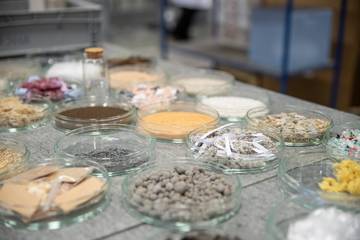Seven projects succeeded in the Environment for Life applied research programme
n a competition of more than three hundred submitted project proposals, the Technology Agency of the Czech Republic selected seven projects involving the Faculty of Civil Engineering of Brno University of Technology. The projects focus on water management, recycling of building materials or light pollution.
Natural wastewater treatment plants
The main impetus for the scientists from the Institute of Water Management was the long-standing cooperation with municipalities that operate extensive wastewater treatment plants and want to improve their use or are thinking about acquiring a natural-based treatment plant. The project will begin with detailed monitoring of various parameters, including monitoring of the operational and financial requirements of specific plants. The scientific team will not only look at organic pollution, focusing on basic elements and compounds, but will also include the recently increasingly sought-after observation of the presence of pharmaceuticals and microplastics. The aim of the project is to design optimal operational strategies and design changes to maximize the efficiency of the treatment plants in order to make this type of plant competitive as is commonly done abroad.
Production of cement composites from construction waste
Demolition and construction waste as a source of material for further use must meet strict quality requirements. The research team of the Institute of Technology of Building Materials and Components and VŠB TUO will focus on the possibility of obtaining suitable sources of fillers for concrete from construction and demolition waste, which is generated annually in the Czech Republic about 10 million tonnes. The main focus is on the processing of concrete and brick recyclates as products with stable properties that will replace natural sources of aggregates. Their recycling and solidification (stabilisation) with suitable binders will produce a new silicate composite material. Its main advantage will be not only the desired properties of conventional concretes, but also a reduced environmental impact and the provision of a circular economy.
Rainwater harvesting paved areas
Sun-heated streets, hot concrete surfaces and rapid rainwater runoff worsen living conditions in cities and reduce groundwater retention significantly. Researchers from the Institute of Building Materials and Components Technology and the Faculty of Chemistry in cooperation with Prefa Brno will work on the innovative use of a superabsorbent polymer to develop a new type of absorbent concrete and subsequently produce concrete pavements and road base layers. The porous concrete with the addition of absorbent flakes from recycled diapers will retain rainwater, which will then slowly evaporate. This will contribute to cooling and improving the microclimate in the city. The project will not only create a new building material, but also a design solution for the paved roads.
Analysis of natural floodplain restoration and floodplain efficiency
The Institute of Water Structures in cooperation with the Academy of Sciences will investigate the effectiveness and possibilities of improving structural flood protection measures. For example, they will use field surveys, local knowledge, historical data including maps or older satellite images, surrounding forests and fields and the state of the landscape in general to analyse the situation. State-of-the-art technology - drones - will also be used to provide hyperspectral and multispectral data. The research will also include an assessment of the retention potential in the area of interest and an assessment of the uncertainties in the system of feasibility of the measures.
Impact of health care facilities on micropollutant loading to municipal wastewater treatment plants
The aim of the project, which will be carried out by the AdMaS team, is to investigate micropollutants in wastewater treatment plants and to propose possible solutions to reduce their occurrence. The model cities will be Brno (in the category of over 100,000 inhabitants and catchment and highly specialised healthcare facilities) and a district city (in the category of over 10,000 inhabitants and one major healthcare facility). The project is related to the proposal of the Directive of the European Parliament and of the Council on urban wastewater treatment (2022/0345/COD), which implies an obligation to monitor and reduce micropollutant pollution at wastewater treatment plants from 2036.
Omnidirectional light pollution analyser
Scientists from the Institute of Civil Engineering, in collaboration with a team from the FEEC BUT, will develop an instrument that will be able to analyse sources of interfering light in terms of leakage into the environment. At present, the vast majority of the light interference from the Earth's surface is investigated (and evaluated). However, light sources are emitted in all directions from the air. The instrument should help to collect objective data that will assist in designing solutions to reduce light pollution.
Next-generation cement-bonded particleboard with direct impact on climate change mitigation
Composition design and new technology for the production of environmentally friendly cement-bonded particleboard are the two main objectives of a joint project between the Institute of Building Materials and Components Technology and CIDEM Hranice. Scientists will focus on the development of a binder so that less Portland clinker is needed for its production, while maintaining the quality parameters of the slabs. Reducing the consumption of Portland clinker will enable a reduction in the carbon footprint and the consumption of primary raw materials.
The seventh Environment for Life competition was launched last July. The programme is designed to support applied research, experimental development and innovation in the environmental field.
| Short link | https://www.fce.vutbr.cz/en/research/achievements/413 |
|---|---|
| Responsible person | Mgr. Almíra Pitronová |
| Published |
